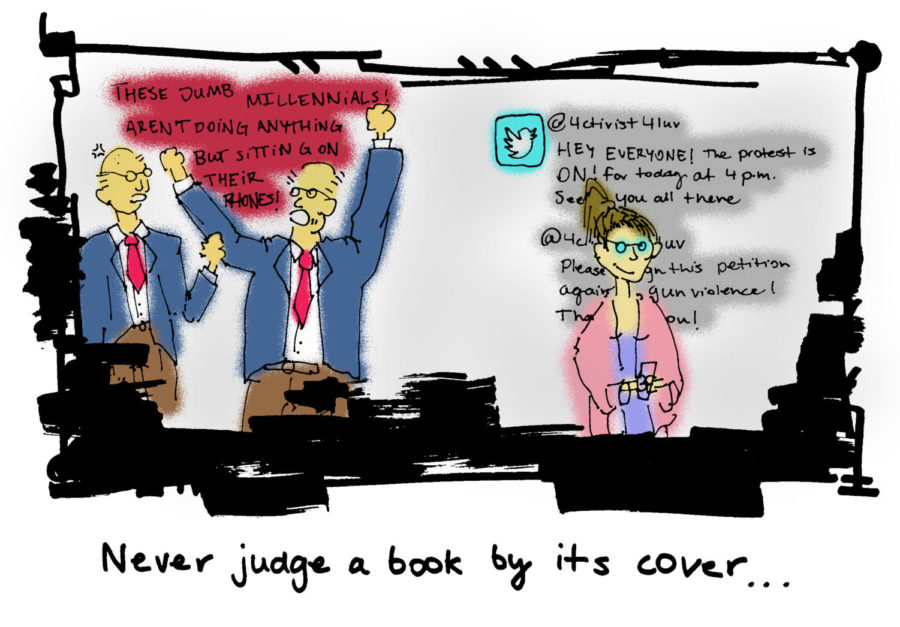We the (young) people
A call to action inspired by modern-day power of millennials.
It is no secret that, as a society, we are in a time of great change. From a tumultuous election to a chaotic first year of presidency, America has been on a rollercoaster of ever-changing political and social climates. Things like Executive Order 13769 (coined the ‘Muslim Ban’ or ‘Travel Ban’), intolerance towards transgender people in the military, the sheer unwillingness of lawmakers to enforce stricter gun control, and the looming threat of reversing Roe vs. Wade and defunding Planned Parenthood have pushed U.S. citizens to their breaking point this past year. All of these disgusting government decisions are a platform for change to occur; we as people have our voices, our right to vote, our right to protest, our right to assemble, and our right to petition. So, let’s use it.
In 1960, four young African-American students lead a sit-in at a segregated Woolworth’s lunch counter in Greensboro that refused to feed customers if they weren’t white. They stayed at the lunch counter until the store closed, and then returned the next day. When African-American people heard the news, all across the nation they joined in on these peaceful protests at places like libraries and beaches, eventually procuring integration within dining establishments all across the South. These young men were college students, not far from the age of the people writing this newspaper. They lived normal lives, went to school, did everything they were supposed to– but were brave enough to stick their neck out. If everybody stuck their neck out a little bit more for what they believe in, they could inspire mass change as well.
According to the Center for Information and Research on Civic Learning and Engagement (https://www.brookings.edu/blog/fixgov/2016/11/21/how-millennials-voted/), 18 to 29-year-olds made up 50% of the voter population in the 2016 presidential election. That means that high school students up to young adults have half of the power in major elections. We have half. That is a generation of people only 10 years apart boasting half of the political voting power of an entire nation.
The younger generation displays a sense of unity that no other generation has possessed before. Teens and young adults are connected by social media platforms and constantly have the ability to communicate and form new ideas. Their newfound ability to assemble is remarkable; they have every single tool layed out for them. The internet provides ample resources to spread knowledge and incite change, one of them being ResistBot (https://resist.bot/). ResistBot is a tool that allows people to easily access Congress and get a message to them in under two minutes. Simply text “RESIST” to the telephone number 50409 and the bot will find out who represents you in Congress and deliver your message to them in under two minutes.
Another fantastic tool is a website by the name of Everytown (https://everytown.org/) that possesses a wealth of knowledge on gun violence and safety. This website displays a plethora of ways to contribute to the movement that aims to stop gun violence, including links to petitions and events to protest at in your local community. Everytown also enables you to register to vote and tracks elections happening in your community– there is no excuse to not be in the know.
We see change happening right now before our eyes. We see Florida school shooting survivor Emma Gonzales and her friends challenging Congress, standing up to the NRA, and gaining the support of thousands of like-minded individuals across the nation. We see petitions being made, we see marches being had, we see posters and t-shirts and articles about change. The young people of America have the power now.
So, how will you use your voice?
YOUR TURN: What current issues within the political and social climate do you want to see change being made in? How do you plan to evoke this change?









Anon • Apr 2, 2018 at 1:51 am
I’m just posting to say that we’re not millennials. Culturally, millennials cut off between 1996 and 1998 typically, depending who you ask. The 2000 cutoff is more of a light categorization by informal sources, but not the research of any reliable demographic study. I don’t want to be thrown in with people who eat avocado toast and browse Tumblr.